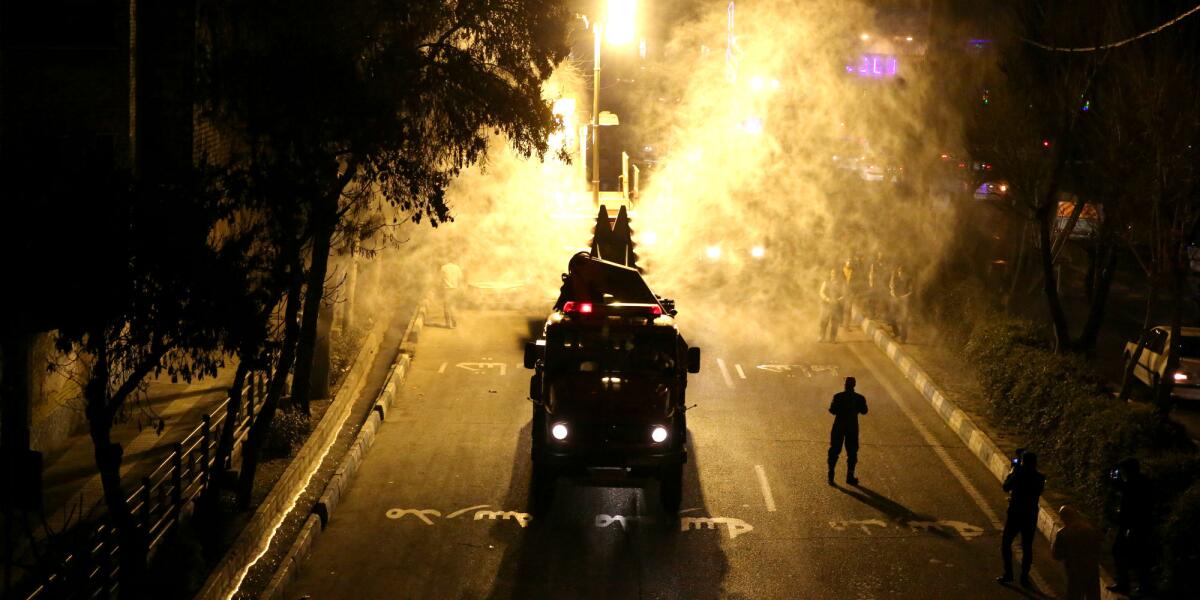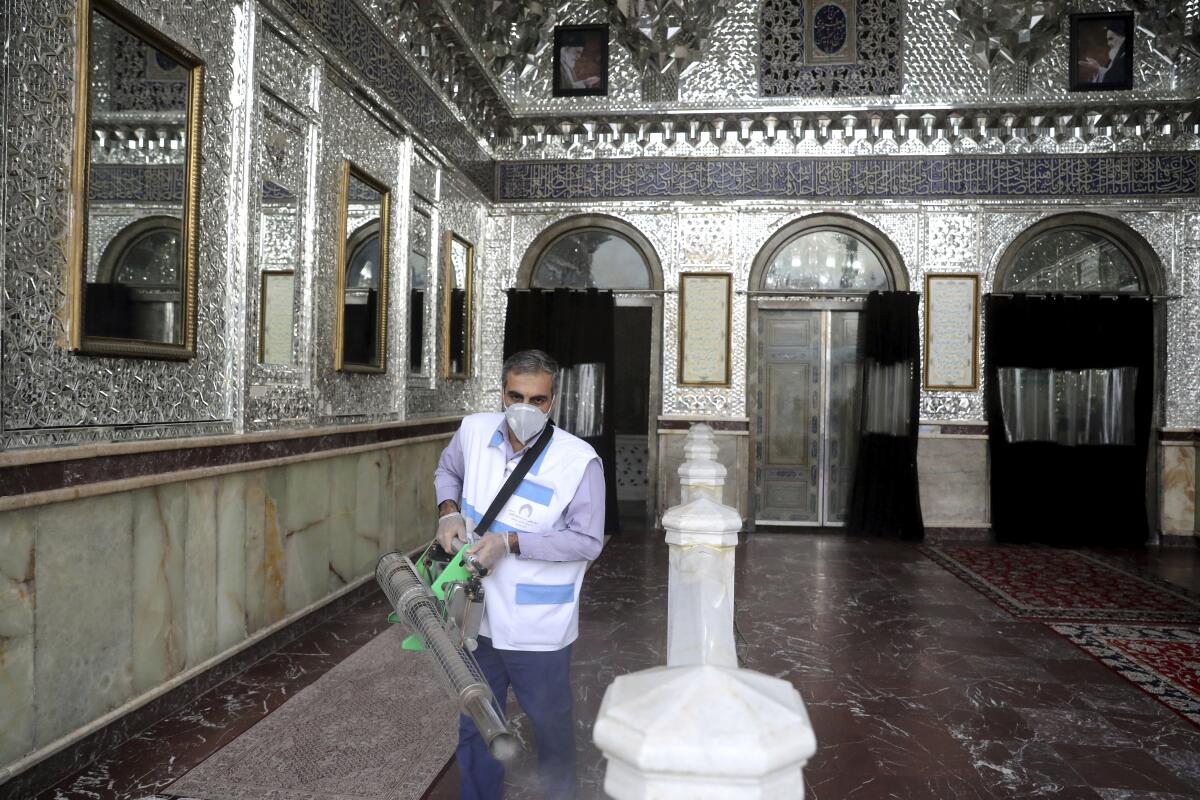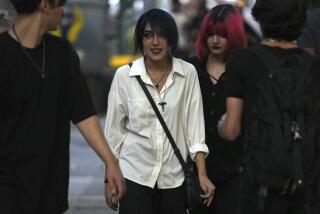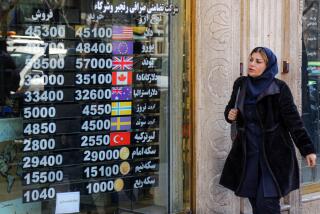Iranians cope with coronavirus with dancing doctors and humor

Iranians talk about quarantine, the shortage of supplies, frustration with the government and other challenges amid the virus pandemic.
- Share via
Doctors dance to lift patients’ spirits while friends bring meals to those too scared to leave their homes in Tehran. In nearby provinces, residents raise money to buy face masks for medical workers and locals threaten to block roads into areas with high coronavirus infection rates.
Mistrustful of their clerics and fed-up with their leaders, Iranians are uniting, cracking jokes and putting themselves on the front lines to ease anxious minds, soothe the infected and curb the spread of the deadly virus that’s so far killed 514 people in the country. Friday prayers have been canceled and tens of thousands of inmates have been furloughed.
The military has been ordered to take control of containing the virus. Citizens have been informed they will be monitored through “cyberspace and phone calls.” But even in these unprecedented times, when “social distancing” is the watch phrase, humor leavens daily life.
“Hello, friends, how are you?” one man asks two others in a Twitter video. Instead of kissing cheeks in the traditional Iranian greeting, the men, standing on a sidewalk in front of a shop, lift their shoes and tap each others’ feet.
“Be well,” one of them says before walking away with his hands in his pockets.
Iranians have long relied on wry humor and satire to weather adversity. For more than a decade, they have lived with the threat of war, withstood government repression and braced against U.S. sanctions, all the while feeling abandoned by their theocratic leaders, who often paid more attention to Iran’s stature in the world then to failings at home. This has included not acknowledging the breadth of the pandemic.
“There is no doubt that the government is useless,” said Rafa Rostami, 34, a bookstore owner in Tehran. “They do not care about people.”
Since authorities announced its first case more than two weeks ago, the number of people infected by the coronavrius has ballooned, surpassing 11,300 on Thursday, health ministry spokesman Kianoush Jahanpour said in a televised statement. Even Iran’s officialdom has not been spared.
More than a dozen current and former leading politicians have been infected by the virus and several top government officials have died, including newly elected member of parliament Fatemeh Rahbar, reformist politician Mohammad-Reza Rahchamani and Farzad Tazari, a former deputy in Iran’s Revolutionary Guard Corps, according to the semi-official ISNA news agency.
The coronavirus outbreak in Iran, one of the worst hit countries outside China, has collided with a nation still in mourning. Last November, hundreds of protesters were killed and thousands arrested when the government violently suppressed demonstrations against gasoline price hikes of as much as 50%.

The country of 80 million veered into turmoil in January when dozens of people died and hundreds were injured during a stampede at the funeral procession for Gen. Qassem Suleimani, the commander of Iran’s elite Quds Force who was killed in a U.S. drone strike. Days later, the Iranians learned the government had covered up the accidental shooting down of a Ukrainian passenger jetliner that had killed all 176 on board.
Now, as nations across Asia, Europe and North America adjust habits and alter rhythms of daily life, the resilience of Iranians has brought laughs and steeliness to an outbreak that has no foreseeable end. At overburdened hospitals across the country, doctors and nurses are not only treating patients, they are dancing.
Videos of medical professionals clothed in white hazmat suits, swirling their hands in the air and twirling in circles have have gone viral on social media, an antidote to the bleak reality that a government weakened by mismanagement has been unable to effectively respond to a pandemic that’s shaken the country.
Prisoners have also banded together.
Inside Tehran’s Evin Prison, Shahnaz Akmali and her cellmates took turns scrubbing to prevent the virus from spreading inside densely packed cells. Akhmali was one of 70,000 prisoners recently released on temporary furlough when authorities ordered precautionary measures to curb the virus from spreading through penitentiaries.
“The women’s war of Evin Prison was [to] clean. All the women, themselves, did the job,” she said.
Akmali, who was charged in early January with spreading propaganda against the Islamic Republic, said she is relieved to have been released because the clinic inside the prison was a virus hot zone: “It was extremely dirty,” she said. “Even if someone had a fever we didn’t want to go to the clinic. They didn’t have medicine.”
The sense of unease has been heightened by the government’s lack of transparency and estimates by medical professionals and some officials that the number of Iranians infected and killed by the virus is much higher than what the government reports.
In Mazandaran province in northern Iran, people in Amol city demanded authorities block roads in order to prevent non-residents from entering the highly contaminated region where the number of infected has spiked above 600.
“Not only the natives of Mazandaran but all others are dying in the province. Close the roads,” Mazandaran lawmaker Ahmad Lashaki told President Hassan Rouhani’s chief of staff on the phone last week in a video that’s since gone viral.
To safeguard the old and frail, some are taking it upon themselves to avoid any and all contact. On a recent wintry afternoon in Tehran, pharmacist Hossein Elhamnezhad was catering to a swarm of customers seeking face masks and hand sanitizers when his cell phone rang.
On the other end was his elderly mother who wanted to invite him over for dinner.
“I’m not going to come home for at least two weeks,” he told her, scared he might unknowingly carry the virus to her.
She tried to change his mind, but Elhamnezhad refused.
“I found a place which belongs to one of my friends,” he said. “I’m going to stay there,” he told her.
Such caution is painful but necessary, Elhamnezhad said after he got off the phone.
“I try to stay away from my family and friends because my job puts me at high risk of getting infected,” he said. “I will not be able to forgive myself if they get the virus from me.”
Elhamnezhad is also contending with skyrocketing prices on a black market for medical supplies.
“A black market dealer came into my store and offered me masks, so I asked him, ‘How many masks do you have?’ He said, ‘How many do you want? I can provide 100,000, 200,000 and even more, but the price is more than twenty times that before the coronavirus,’ ” said Elhamnezhad.

“People feel that they have no one that they can depend on,” he added. “They are defenseless and alone in the face of this disaster.”
But words of comfort only go so far. A woman came inside, begging him to sell her a mask. Elhamnezhad told her the price would be 30,000 toman, the equivalent of $2. She lowered her head and walked out.
Such encounters have grown more frequent after government officials announced on national TV that more than one million masks have been distributed.
“They put us in front of people with these lies and now people think we are hoarding face masks,” he said.
In Gilan province, one of the region’s hit hardest by the virus, Mahsa Amrabadi 35, had been self-quarantining herself at home, when she decided things had become too dire. Noticing that medical professionals were running low on gloves, masks and gowns, she led a campaign with friends and colleagues to buy medical equipment for the doctors and nurses who are caring for more than 400 patients.
“Everyday, we hear that medical staff are dying because of the lack of protective gear. We thought that this is the only thing that we can do for our beloved ones,” she said. “The government should take responsibility, but we are in crisis now and we have no choice. People should stick together.”
A special correspondent in Tehran contributed to this report
More to Read
Sign up for Essential California
The most important California stories and recommendations in your inbox every morning.
You may occasionally receive promotional content from the Los Angeles Times.










